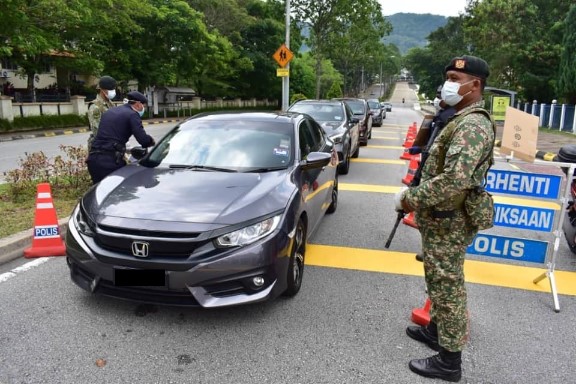As new daily Covid-19 cases rise to double digits in Malaysia, Senior Defence Minister Ismail Sabri Yaakob warned Malaysians yesterday about the possibility of re-imposing the strict Movement Control Order (MCO) if cases increase to above 100 a day.
The government will kill the economy and our livelihoods if it enforces the same strict nationwide version of Malaysia’s first seven-week MCO. The devastation that the coronavirus and lockdown have wreaked on our economy hit close to home when two of my neighbour’s sons in Taman Tun Dr Ismail lost their jobs, while a business premise in my neighbourhood was plastered with “for sale” signs.
A JobStreet survey conducted in May estimated that 20 per cent of respondents had been retrenched, while 35 per cent of Malaysians suffered salary cuts of more than 30 per cent during the MCO. The survey found that more than two million Malaysians expected to end up jobless. Officially, Malaysia’s unemployment rate rose to 5.3 per cent in May this year from 5 per cent in April, with the number of the unemployed increasing by 47,300 people to 826,100 individuals.
Malaysia used its trump card early on with the first MCO from March 18 to May 3, grinding the economy to a halt for nearly two months to slow the transmission of the coronavirus, or “flattening the curve”, so that it doesn’t overwhelm the health care system.
The nationwide lockdown was not meant to eradicate the virus, but to give us enough time to build up capacity in our health care system so that we can treat all Covid-19 patients who need treatment.
Deputy Health Minister Dr Noor Azmi Ghazali said recently that Malaysian hospitals are expected to be able to accommodate an increase of Covid-19 cases, with 7,364 beds prepared for Covid-19 patients across 40 public hospitals and 26 quarantine and treatment centres. The 40 Covid-19 hospitals have prepared 422 beds in the intensive care unit (ICU) and 1,331 ventilators for coronavirus patients.
We should also keep in mind that 70 per cent of 8,674 confirmed Covid-19 cases in Malaysia, as of July 7, did not show symptoms, according to the Ministry of Health (MOH), which means that only a minority of Covid-19 patients need treatment. Those who are asymptomatic or have mild symptoms simply need to be quarantined to prevent them from infecting others.
So, I would argue that another nationwide MCO – which only allows people to travel a maximum of 10km from their homes while businesses shutter – is completely unnecessary and will only do more harm than good. We simply don’t have the financial resources (State or private) to endure another MCO. Plus, there are the unseen health costs of people with other conditions, such as cancer, cardiovascular disease, or diabetes, who may be denied further access to treatment during a second lockdown.
If the government really wants to do a lockdown, then it should be restricted to the locality of an outbreak. So far, only the district of Kuching in Sarawak is on the brink of red-zone status, with 40 new locally transmitted Covid-19 cases reported within the past 14 days as of July 26, according to MOH. It’s unsure if the rise of cases in Sarawak is due to more aggressive testing. The more we test, the more cases we get. An MCO might deter states from increasing testing rates to avoid a lockdown.
While the authorities’ blame on public complacency may be somewhat warranted, the government should understand that people cannot stay in a heightened state of fear from the virus, which had been the primary motivator for people to comply with the MCO and SOPs. “Caution fatigue” can result from reduced sensitivity to repeated warnings over the months.
We stop washing our hands frequently, wear masks, or practice social distancing because we de-emphasise the actual risk of the virus, according to a professor in psychiatry and behavioural sciences. Then there is the stress of lay-offs and pay cuts, which puts health measures further behind people’s minds as they’re preoccupied with feeding their families.
I don’t think law enforcement is the answer to “caution fatigue” in Malaysia.
Malaysians were fined RM1,000 or incarcerated for violating the first MCO, even though some were just desperately trying to feed their families. When face masks are made mandatory in public areas from August, I foresee a resurgence of jail terms and maximum fines for non-compliance. The Prevention and Control of Infectious Diseases Act 1988 provides for a fine of up to RM1,000, maximum six months’ jail, or both.
Like the MCO – when politicians and VIPs escaped prosecution despite blatantly breaking the lockdown, while the low-income suffered the brunt of the law – I won’t be surprised if the same thing happens after the totalitarian mask rule comes into effect. Enforcement always carries opportunities for corruption too. We may see desperate jobless people offering bribes to escape prison.
What is worse is that the government isn’t equipping the poor to follow the rule by giving them free reusable masks, telling us instead to sew our own masks according to World Health Organization (WHO) specifications. The WHO guidelines for three-layer fabric masks aren’t exactly simple either. Even I wouldn’t know how to make them. Singapore, on the other hand, gives residents two free reusable face masks that can be collected from vending machines.
Malaysian supporters of mandatory face masks cite countries like France and Hong Kong, and Australian city Melbourne, that have also made face coverings compulsory in public places. But, unlike Malaysia, Australia doesn’t immediately threaten its people with arrests and prosecution for not obeying rules down to the letter of the law. The Guardian reported Victoria premier Daniel Andrews as saying that “common sense” would guide the new rules on compulsory face coverings in public in Melbourne, saying that people won’t be required to wear a mask when it’s impractical, such as when exercising or visiting a bank.
The Guardian report on the reintroduction of a stage three lockdown in Melbourne, amid a surge of new Covid-19 cases in the state of Victoria, specifically lists various purposes for which one can leave their house: shopping for food and essential items, care and caregiving, daily exercise, work and study (though working or studying from home is strongly encouraged). Australia also specifically states that one can leave their house if they are at risk of family violence; to access medical services, including donating blood; and even to care for animals housed elsewhere.
Malaysia, on the other hand, uses a heavy-handed law enforcement approach in managing the Covid-19 outbreak, as evidenced by the numerous arrests during the MCO.
A 10km rule means no going anywhere beyond 10km from your house: no ifs or buts, as imposed by the police, even if the written regulation may provide exemptions. Cancer patients were reportedly denied access to treatment when they were turned around at roadblocks despite possessing documentation.
Even now, during the Recovery Movement Control Order (RMCO) when the economy mostly reopened – except for bars and night clubs that bizarrely remain closed despite the lifting of a 250-person limit at events – Ismail Sabri continues to report daily arrests for MCO violations. Yesterday, 617 individuals were arrested for flouting MCO rules: 331 for patronising pubs and night clubs, and 286 for participating in group activities where social distancing is impossible.
The government should realise that it cannot continue using the stick in any new Covid-19 surge. This is a public health crisis, not a crime wave. Malaysia had an astonishing 95 per cent compliance rate during the MCO. Now is the time for the government to increase education and awareness campaigns about the coronavirus and SOPs, and also to increase testing and use effective contact tracing methods so that we can quickly contain new outbreaks. MOH should work with the 7,000 private general practitioners (GPs) throughout the country to help watch out for Covid-19 cases in the community, like in Singapore, rather than take the entire burden on itself.
Test, trace, contain is the mantra.
MOH reported that 2,897, or 16 per cent, out of 17,897 returnees from abroad, as of July 24, have yet to turn up at a district health office to get tested on Day 13 of their home quarantine. Ismail Sabri said starting today, the police will arrest and charge those who have yet to do their second Covid-19 test.
Since Ismail Sabri says the government already has the names and addresses of quarantined individuals, can’t MOH go to these 3,000 people and test them at home, instead of asking them to go out to a district health office? MOH has previously gone to the ground and tested people in Enhanced Movement Control Order (EMCO) areas. Why threaten to incarcerate them and potentially worsen the outbreak when cases have already been reported in two prisons in Sabah and Kelantan?
Health care must be made simple. This is especially pertinent in Malaysia that has low health literacy.
People may mistakenly believe that because they tested negative the first time, they do not have to do a second test on Day 13 of their quarantine, especially if they don’t have symptoms. Rather than threatening people with police action, the government should explain difficult Covid-19 jargon like “incubation period”, “asymptomatic or pre-symptomatic transmission” and the difference between rapid tests and PCR tests, so that Malaysians understand that they may be contagious even after a long period of not having symptoms.
These education materials should be published in Bahasa Malaysia, English, Chinese, Tamil, other local languages, and even foreign languages for foreigners living here so that as many people as possible understand the virus and the importance of testing and the SOPs. This job shouldn’t be left to MOH alone; the Communications and Multimedia Ministry should step in too and work with the private sector to disseminate these materials.
The same applies to wearing face masks. The guidance on wearing face masks is relatively new, since previously, we were only told to wear them if we had symptoms. How many Malaysians understand what is “airborne or aerosol transmission”? How many Malaysians know that people above 60 and those with underlying conditions like diabetes (which affects one out of five Malaysian adults), or lung or heart disease face higher risk of falling severely ill from Covid-19? People will be more inclined to follow SOPs if they understand why they have to do it and how they can protect their health, not just because of the threat of arrests.
Since many Malaysians look up to lawmakers, it would help if political leaders follow SOPs themselves, rather than take group pictures without any social distancing or pictures of them wearing their face masks incorrectly. If our leaders themselves, most of whom are in the high-risk group of the elderly, can’t be bothered to follow SOPs, why should ordinary citizens?

Boo Su-Lyn is CodeBlue editor-in-chief. She is a libertarian, or classical liberal, who believes in minimal state intervention in the economy and socio-political issues.








